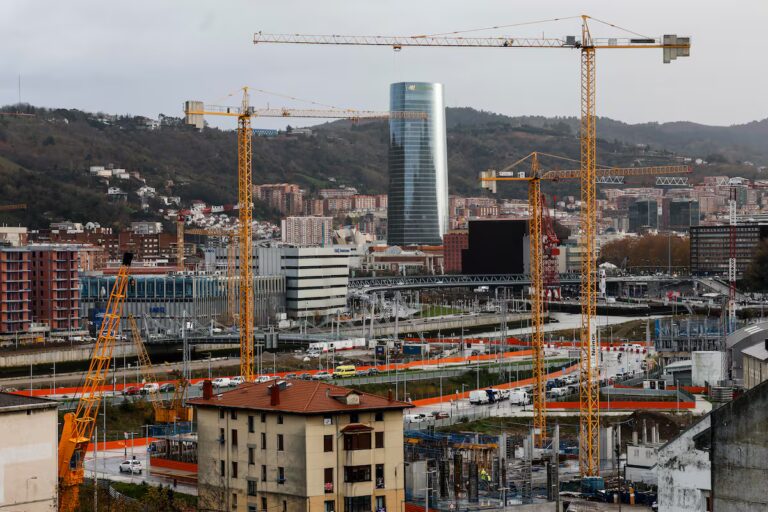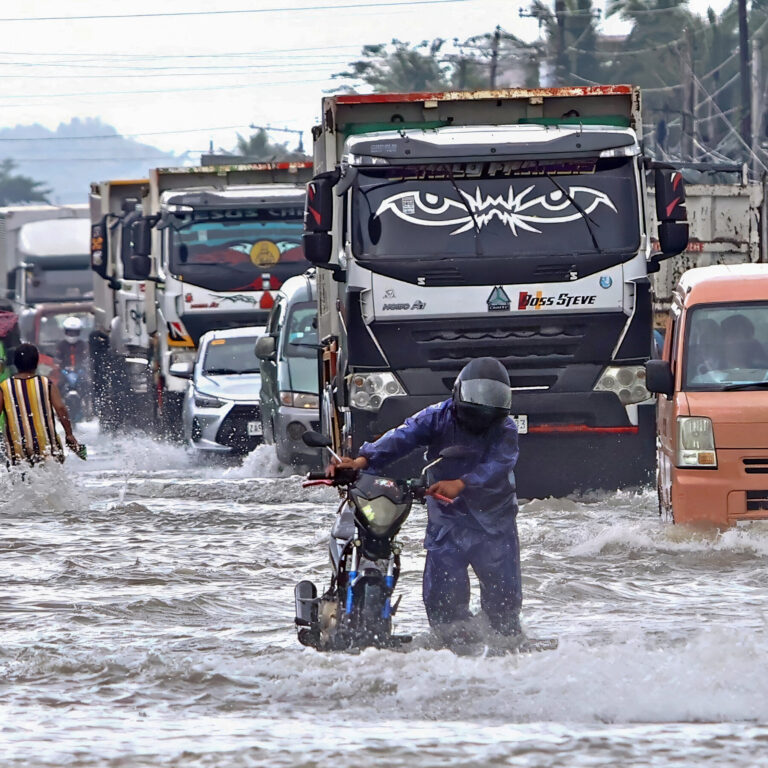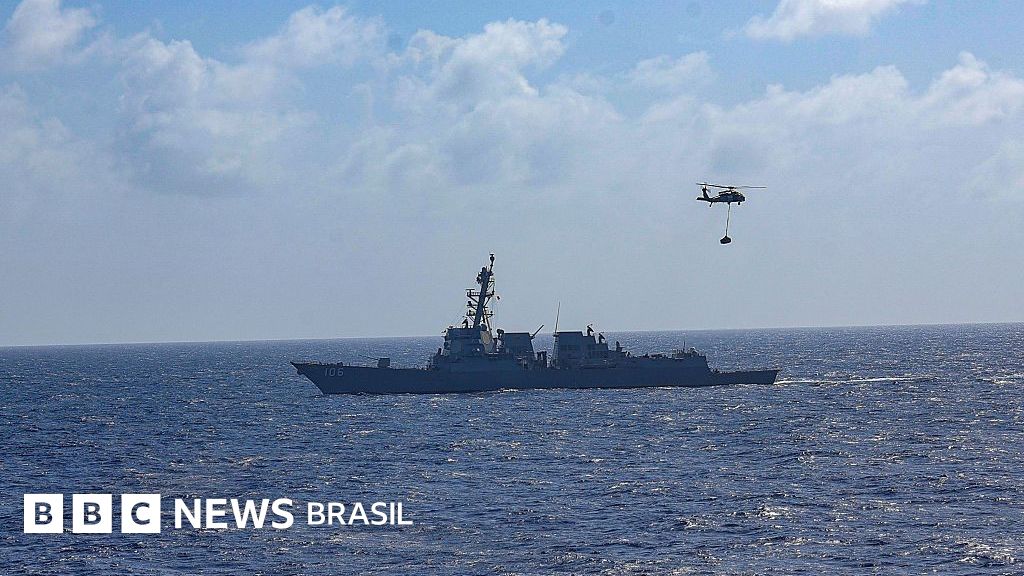
credit, US Navy (via Getty Images)
Lula was not originally scheduled to attend the event, but at the last minute he announced that he would be leaving COP30 in Belém for a few days and heading to Santa Marta.
According to the Brazilian president, the CELAC meeting only makes sense if US warships located in the Caribbean are on the agenda. “We are a zone of peace and there is no need for war here. The problems that exist in Venezuela are political problems that must be solved through politics,” Lula added.
President Donald Trump’s administration claims to be leading efforts to suppress drug trafficking in the region, accusing Venezuelan President Nicolas Maduro of leading the Cartel de los Soles, which is classified as a narco-terrorist organization.
The U.S. military has attacked ships suspected of transporting drugs at least 17 times in the Caribbean near the Venezuelan coast in recent weeks, killing more than 60 people.
The horizon for conflict between the two countries is closer than ever, and rising tensions could have serious implications for Brazil, which shares a 2,200-kilometre border with Venezuela, according to experts interviewed by BBC News Brazil.
Carolina Silva Pedroso, a professor of international relations at the Universidad Federal de São Paulo (Unifesp), said U.S. action could take the form of attacks by sea, land or air, but also through U.S. support for some kind of domestic resistance against Maduro’s regime using the CIA.
“While it is not clear what the next steps for the United States will be, there is growing strong evidence that there is indeed a plan to combat drug trafficking that goes beyond official legitimacy,” Pedroso said.
And experts say that no matter which scenario worsens, the impact on other countries in South America is virtually inevitable.
Find out below what is at stake and what are the four main impacts Brazil could suffer if the conflict escalates.
Regional instability and militarization risks
Monica Hertz, a professor at the PUC Rio Institute of International Relations, said the presence of U.S. aircraft carriers and troops in the Caribbean breaks with Latin America’s tradition of non-belligerency.
“This calls into question decades of efforts to maintain the South Atlantic and Latin America as a zone of peace,” Hertz warned.
Experts believe a U.S. invasion of Venezuela is unlikely, along the lines of Iraq, where U.S. forces and their allies invaded the Middle Eastern country in 2003 to overthrow Saddam Hussein’s regime.
But Hertz said the Trump administration’s recent attacks on ships and a significant expansion of its military presence in the Caribbean represent a huge show of force by the United States in a dispute over its sphere of influence.
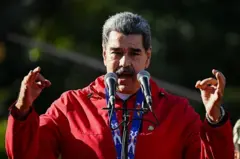
credit, Getty Images
“Since the Monroe Doctrine, there has been a long tradition of viewing Latin America as an area of influence for North America. But there is also a current reality with this government asserting the absolute supremacy of military relations and throwing all international law in the trash,” he says. “It’s a very worrying situation.”
All of this has great potential to cause instability in the region, from military, political, humanitarian and economic perspectives, the professor says.
Hertz also noted that, at least until now, there has been no evidence of large-scale dialogue among Latin American leaders seeking agreement or resolution to the crisis, indicating a lack of coordination to deal with the escalation.
Meanwhile, Carolina Pedroso does not rule out the possibility of the current conflict becoming militarized. Experts say Venezuela’s military doctrine, based on “armed civil resistance” and inspired by Vietnam, could turn the country into a theater of long war, with similar effects to the Middle East.
“We see elements of conflicts like those in Syria and Libya in Venezuela, where there are multiple armed groups, political divisions, and external support for regime change that creates long-term problems. This will create a spiral of instability across the region.”
Humanitarian crisis and border pressure
Another direct effect of direct conflict and rising political tensions will be a further increase in the flow of migrants leaving Venezuela, experts say.
“The biggest risk is the deterioration of the humanitarian situation, which is already happening and will undoubtedly intensify,” says Carolina Pedroso. States such as Roraima and Amazonas are already facing social tensions due to the arrival of Venezuelans, with overloaded public services and episodes of xenophobia, she recalls.
With the worsening of Venezuela’s economic and social crisis in recent years, there has been a significant increase in the flow of Venezuelan nationals to various destinations in Latin America and the Caribbean.
Colombia and Peru host the largest number of refugees and migrants from Venezuela. According to the United Nations, 568,000 Venezuelans entered Brazil from 2015 to June 2024.
Monica Hertz also stressed that internal conflicts and civil wars “could pose serious security challenges to the management of Brazil’s borders.” According to her, “this will increase the risks associated with cross-border crime and the flow of arms and drugs within the region.”
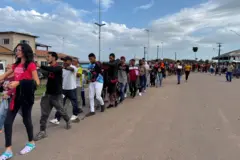
credit, AFP (via Getty Images)
Impact on domestic politics and Brazilian diplomacy
North American intervention would put Brazil’s government in a delicate position, especially on the eve of the 2026 elections.
Experts interviewed by BBC Brazil believe Washington is likely to support the overthrow of Nicolas Maduro’s government.
They say this scenario could also see the rise of rebel Nobel Peace Prize winner Maria Colina Machado and other right-wing forces.
Maria Colina defended American military action in the region, saying in an interview that she maintains contacts with Washington and even sought the Trump administration’s help in overthrowing Maduro.
The rebels also criticized Lula’s stance in a meeting with Trump in October in which he defended a “political and diplomatic” way out of the crisis in the neighboring country and suggested Brazil’s participation as an intermediary in possible negotiations.
In an interview with O Globo newspaper, Maria Colina asserted that any negotiations with Maduro must start from the victory the opposition claims to have won in the July 28, 2024 presidential elections. “Anything else is unacceptable and definitely not coming from a leader who claims to be democratic,” she said, referring to Lula.
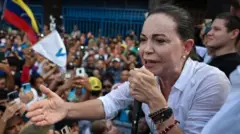
credit, Getty Images
For Monica Herz, the past closeness between Brazil’s current president and his party (PT) and the Maduro government could also complicate dialogue during a regime change.
“With progressive forces facing difficulties in South America, President Lula will face new regional challenges if a right-wing government emerges in Venezuela,” Hertz said.
But Carolina Pedroso believes Brazil is key in the negotiations. “The mediation would not have been successful without Brazil. Brazil is the country with the best political and diplomatic conditions to prevent the conflict from escalating,” he says.
The question, she said, is whether the United States or the Venezuelan government, which could be allied with Washington, would accept Brazil’s actions as a mediator.
“There is still room for diplomacy, but time is running out. With each passing week, the region moves closer to a scenario that would have been unthinkable just a few years ago,” warns the expert.
Security risks and dangerous precedents
Another area of concern is the discourse in North America linking drug trafficking and terrorism.
Since the beginning of his term, Donald Trump has designated several Latin American drug cartels as global terrorist organizations. Experts say the move opens the possibility for the U.S. military to take direct action against these organizations.
The affected cartels include the Venezuela-based Torren de Aragua and the Cartel de los Soles, which the United States says has ties to the upper echelons of the Venezuelan government. These two organizations have been at the center of recent US attacks in the Caribbean.
For Carolina Pedroso, the U.S. strategy of equating drug trafficking with terrorism also leaves room for unilateral action and violations of other countries’ sovereignty.
“If this logic is strengthened, Brazil could become a target of external pressure in the future under the pretext of fighting organized crime,” he says.
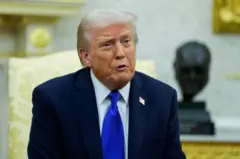
credit, Getty Images
The Brazilian government rejected this comparison. “Terrorism always involves ideological issues: political acts, social repression through sporadic attacks. Criminal factions consist of groups of people who systematically commit crimes that are commuted by criminal law. Therefore, it is very easy to identify criminal factions based on the results of their actions,” Justice Minister Ricardo Lewandowski said recently.
For Monica Herz, internal discussions about Brazil’s security and police behavior in Rio already reflect militarization trends. “The use of force is becoming more normalized, and this is dangerous for democracy,” he said.

